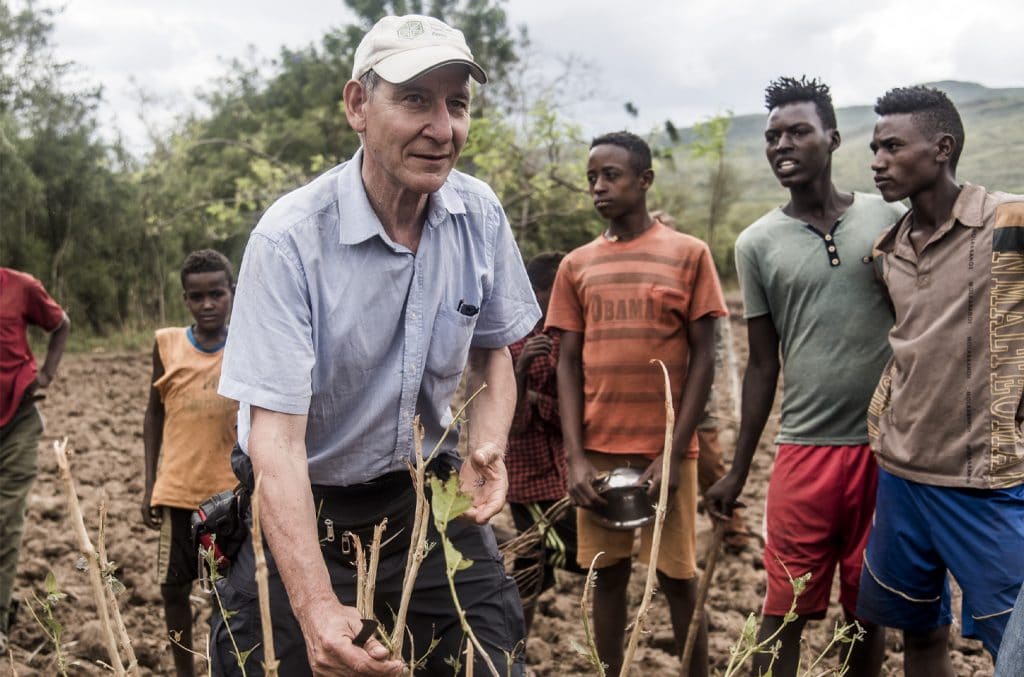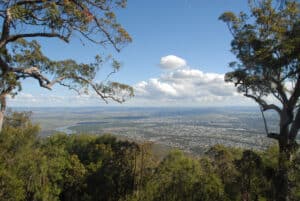
By Stephen Cauchi
3 May 2022
Tony Rinaudo’s story is that of an underground forest.
The agronomist was working in Niger in the 1980s and 1990s, when he realised there was a solution to the deforestation that had devastated the country.
While the trees may have been cut down, their underground root systems were often still intact. Trees could be grown from this “underground forest” if the growth from the roots was pruned and protected in certain ways.
Crucially, the technique – known formally as farmer-managed natural regeneration – was far easier and cheaper than tree-planting.
It’s improved the lives of millions of people.
Mr Rinaudo’s recently launched autobiography The Forest Underground: Hope for a Planet in Crisis covers his work in this field, a journey intertwined with his faith.
The effect of the simple idea to regrow trees from the roots was huge. According to Mr Rinaudo it has restored roughly six million hectares of land, and over 200 million trees in Niger alone.
He believes the method has the potential to restore degraded drylands with an area the size of India.
Mr Rinaudo’s work has earned numerous plaudits and awards for his efforts, including a Member of the Order of Australia, the Right Livelihood Award, and the Commandeur du Merit, Agricole award from the Niger government.
Read more: Why Sally Shaw wants Christians to fall in love with God’s creation
World Resources Institute senior fellow Chris Reij said the technique had probably been the largest positive environmental transformation in the Sahel region, possibly even all of Africa.
Mr Rinaudo said the book had come about as he began to focus on inspiring the next generation to manage projects.
“If by writing this story and showing how God answered prayer and did amazing things – if that would encourage others to use their gifts and to do whatever it is God’s prepared for them to do – then it’s worth me going to the trouble of writing a book,” he said.
Mr Rinaudo grew up in a Catholic family, with a very real faith. At university he began going the Anglican chapel, at the same time starting to own his faith as his own.
In 1982, he and his wife moved to Niger to work with mission organisation SIM. It was here he first encountered the idea which formed the basis of farmer-managed natural regeneration.
Mr Rinaudo said while he had championed and popularized the growing of trees from the roots, it was in one form or another, a very traditional way of managing trees.
The idea is now used in at least 26 countries, mostly in Africa but also India, Myanmar and Indonesia. Mr Rinaudo said his goal was to see the technique being used in 100 countries by 2030 – including more countries in Africa and Asia, but also in Latin America.
He said virtually know country in the world was unaffected by land degredation and deforestation, while more trees also meant more absorption of carbon dioxide from the atmosphere.
“You think of the Amazon basin and what’s happening there, and land being cleared for grazing and or palm plantations and so on,” Mr Rinaudo said.
“That impacts the livelihoods of ordinary people – their food situation, vulnerability to flooding and drought, loss of biodiversity. Those things affect people, not just the environment.”
Read more: Why following God’s call might mean care for … insects
Mr Rinaudo said the economics of Africa had meant the regeneration technique was particularly suitable for the farmer-managed natural regeneration technique, with a steady market for fuel wood used for cooking.
On the possibility of its use in Australia, he said the economics were completely different, but if the environment continued to degrade it might be necessary to use the regeneration technique to protect biodiversity, watersheds and streamlines.
In 1999, Mr Rinaudo returned to Melbourne, where he began working at World Vision, and attending St Alfred’s Anglican Church in Blackburn.
At World Vision, the regeneration technique was the main focus of his work. Until COVID hit, he was travelling overseas for up to six months a year promoting its use to various governments.
Initially this was mainly to developing countries, but after 2012 the technique began to attract more attention globally.
Part of Mr Rinaudo’s work was trying to convince policy makers in these countries that traditional tree-planting did not work.
“Year after year there might be a very low success rate and great expense,” Mr Rinaudo said.
“It’s trying to influence policy makers and donors that an awful lot of money goes into ineffective development activities.”
The Forest Underground: Hope for a Planet in Crisis is published by ISCAST – Christians in Science and Technology. It was launched online on 30 April, and will be launched in person by the Reverend Tim Costello on 31 May at St Paul’s Cathedral.
For more faith news, follow The Melbourne Anglican on Facebook, Twitter, or subscribe to our weekly emails.






